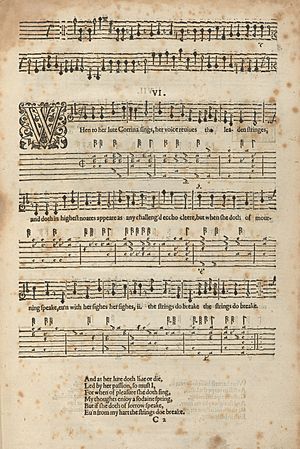Thomas Campion facts for kids
Thomas Campion (born February 12, 1567 – died March 1, 1620) was a talented English person. He was a composer who wrote music, a poet who wrote poems, and a physician who was a doctor. He was born in London and studied at Cambridge University. He also studied law.
Campion created many works. He wrote more than 100 lute songs. These were songs for singing with a lute, which is a stringed instrument. He also wrote music for masques, which were special performances with dancing and costumes. He even wrote an important book about music.
About Thomas Campion's Life
Thomas Campion was born in London. His father, John Campion, worked for the Court of Chancery. His mother was Lucy Searle. When Thomas's father died in 1576, his mother married Augustine Steward. Sadly, she died soon after.
His stepfather, Augustine Steward, took care of Thomas. In 1581, Thomas went to Peterhouse, Cambridge to study. He stayed there for four years but did not get a degree. Later, in 1586, he went to Gray's Inn to study law. He left in 1595 without becoming a lawyer.
On February 10, 1605, he earned his medical degree from the University of Caen. This meant he could work as a doctor.
Campion likely lived in London and worked as a physician. He died in March 1620. Some people think he might have died from the Bubonic plague. He was not married and had no children. He was buried on the same day at St Dunstan-in-the-West in Fleet Street.
At one point, he was linked to a serious event involving Sir Thomas Overbury. However, it was found that he had accidentally delivered something that caused trouble. He was cleared of any wrongdoing.
His Poetry and Songs

Thomas Campion created many works. Some of his earliest known poems were in a book published in 1591. In 1595, he published Poemata. This was a collection of Latin poems that made him quite famous.
In 1601, he released a songbook called A Booke of Ayres. He wrote the words for these songs, and he and Philip Rosseter composed the music. The next year, he wrote a book called Observations in the Art of English Poesie. In this book, he shared his ideas about how English poetry should be written. He preferred poetry without rhymes, like classical Latin poems. Another writer, Samuel Daniel, disagreed with Campion's ideas in his own book in 1603.
In 1607, Campion wrote a masque for a wedding. A masque was a special show with music, dancing, and costumes, often performed for royalty. In 1613, he published Songs of Mourning. These songs were about the sad death of Henry Frederick, Prince of Wales. John Cooper (also known as Coperario) set these songs to music.
That same year, Campion created three more masques. One was The Lords' Masque for the wedding of Princess Elizabeth. Another was for Queen Anne at Caversham Park. The third was for the wedding of the Earl of Somerset. It was a very busy and successful year for him.
In 1615, he published a book about music theory called A New Way of Making Fowre Parts in Counterpoint. This book taught how to write music with different parts playing together. It became a very important textbook for many years.
Around 1617, his Third and Fourth Booke of Ayres came out. In 1618, he wrote the words for songs performed at Brougham Castle. The music was by George Mason and John Earsden. In 1619, he published a new version of his 1595 Latin poem collection.
His Legacy and Impact
Before he died, Thomas Campion made a simple will. He said he wanted to give everything he owned to his friend, Mr. Philip Rosseter. He wished he had more to give. Rosseter officially received his belongings a few days later.
Even though Campion was well-known in his time, his works were almost forgotten after he died. This was partly because of the types of art he created. Masques were very expensive and not common. During the Commonwealth period, they almost disappeared. Song-books also went out of style quickly. The Puritan movement, which disliked most secular music, also led to the decline of the madrigal (a type of song).
Because of this, many beautiful poems and songs, including Campion's, were lost. Luckily, a person named Arthur Henry Bullen helped bring his work back. In 1889, Bullen published a collection of Campion's poems. This helped people realize how talented he was. It brought him back to his important place among the great poets of the Elizabethan era.
Early writers about music, like Fétis, saw Campion mainly as a music theorist. It was much later that people started to see him as a composer too. He also wrote a poem called Cherry Ripe. This is not the same as the more famous song with that title, but it has some similarities.
See also
 In Spanish: Thomas Campion para niños
In Spanish: Thomas Campion para niños
 | Mary Eliza Mahoney |
 | Susie King Taylor |
 | Ida Gray |
 | Eliza Ann Grier |


